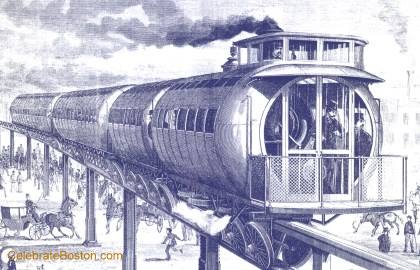 |
Senate Changes Meigs Bill
Meigs Elevated Railway News
ON BEACON HILL.
...
CHANGES IN THE MEIGS BILL.
...
The New Draft Presented to the Senate Judiciary.
"By request of the Senate Judiciary committee, Colonel T.W. Clark, counsel to Joe V. Meigs and others who desire to build an elevated railroad, has drawn up a new bill, which was presented for the consideration of the committee yesterday. The new draft is substantially the same as the bill passed by the House. The alterations are in the first section, where it is provided that Joe V. Meigs and associates 'may associate and become a corporation.' Instead of that, by the act 'they are hereby incorporated,' 'in the manner provided,' instead of 'under' chapter 113 of the Public Statutes. Section 4 of the new bill provides that no location of tracks shall be petitioned for in the city of Boston until at least one mile of the road has been built and operated, nor until the safety and strength of the rolling stock, structure and motive power have been examined by the commissioners. Section G provides that the provision of sections 13 and 14 of chapter 113, and sections 38 to 40 inclusive, and sections 43 to 45 inclusive of chapter 112 of the Public Statutes and of chapter 265 of the acts of 1882 shall apply to said corporation. The principle change in the bill is the following addition to section 7 of the House bill, which is designed to give greater protection to abutters on the streets through which it is intended to construct the road: 'But said corporation shall not acquire title to any land, nor enter upon any street, until all damages to the owners of the land and abutters on any part of a street occupied by its structure have been paid or secured by a manner satisfactory to the owner, or to be fixed by the Superior Court or any justice thereof, sitting in equity for the county where the land lies, upon the petition of either party and summary hearing. And the erection of the structures authorized by this act, in any street, shall be deemed a new servitude, for which damages may be claimed by any owner of land, having a residuary fee or an easement appendant or appurtenant to his land, in, on, or over such street. And such petition for damages on any street shall be instituted within three months after the structures authorized by this bill are built and operated in such street.'
This additional protection is said to be very satisfactory to many who have heretofore opposed the bill, and it is stated that Senator Andrew, who strongly objected to the bill because, in his opinion, it lacked sufficient assurance of protection to abutters, now feels perfectly satisfied with the bill in itself, and will now oppose on the ground only that public necessity does not yet demand an elevated railroad."
Source: Boston Globe, February 26, 1884
